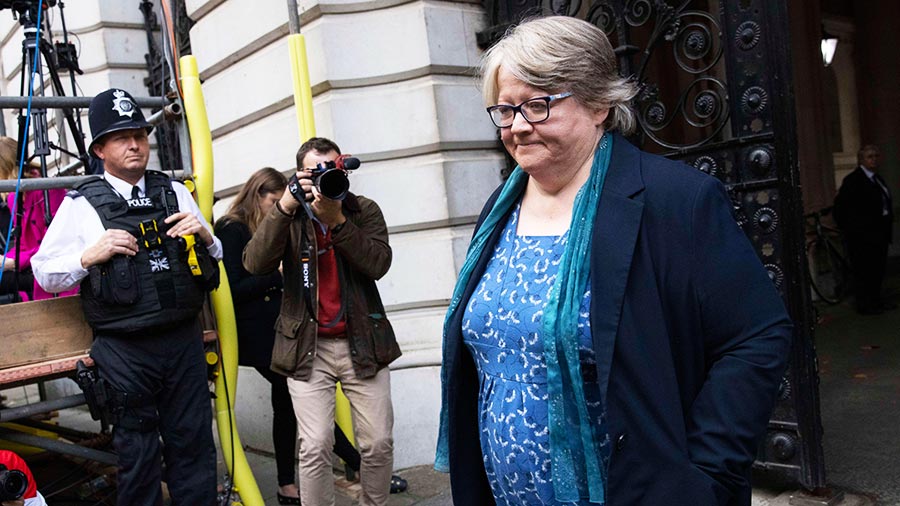Therese Coffey returns to Defra amid calls for clarity on ELM
 Therese Coffey arrives to be informed of her Cabinet position in Downing Street as Rishi Sunak forms his government © Jeff Gilbert/Alamy Stock Photo
Therese Coffey arrives to be informed of her Cabinet position in Downing Street as Rishi Sunak forms his government © Jeff Gilbert/Alamy Stock Photo Suffolk Coastal MP Therese Coffey has been appointed as the new Defra secretary as part of the reshuffle of ministers effected by prime minister Rishi Sunak in his first day in office, shifting from her previous role as deputy prime minister and health secretary.
The appointment marks a return to Defra for Ms Coffey, who served as parliamentary undersecretary and latterly as minister of state in the department from 2016 to 2019, with particular responsibility for the environment.
See also: Defra secretary Jayawardena resigns before cabinet reshuffle
In her time there, she had a particular focus on issues like fly-tipping, flood management and woodland creation, and was an advocate for the government’s clean air strategy.
Starting back at Defra in the top job, one of her first priorities will be getting the government’s flagship Environmental Land Management (ELM) scheme back on track.
Previous Defra secretary Ranil Jayawardena had opened a review of this policy, prompting fears among green lobby groups that he was about to renege on environmental commitments – the so-called “attack on nature” – and triggering dismay among farmers that the current uncertainty would be extended.
Reaction
Reacting to Ms Coffey’s appointment, NFU president Minette Batters said she really was in the “last chance saloon” in terms of delivering the new food, farming and environmental support policies.
“The anger and frustration on the ground is palpable,” she said. “We just want to know what the plan is.
“It has always been made clear that we need to get over 70% of farmers onto that foundation platform (the Sustainable Farming Incentive), which needs to see a minimum of 65% of the resource. The clock is ticking.”
Ms Batters said she would also be looking for Ms Coffey to deliver on the prime minister’s previous commitments to improve food security and boost food exports.
Rock Review
Tenant Farmers Association chief executive George Dunn added that it was at least “useful” that the new Defra secretary had previous experience of being a minister within Defra.
“We hope this will allow her to hit the ground running,” he said. “Her first priority should be to get her head around the Rock Review report (on tenancy reform and helping tenants participate in ELM), which will provide her with quick wins for progressing both the environmental and productivity agendas within agriculture.”
Vicki Hird of food and farming alliance Sustain agreed experience mattered.
“As new Defra secretary, Ms Coffey has a huge ‘to do’ list but, as she is not new to the department, she should know the basics.
“Securing three top, integrated goals of viable and resilient farm and rural futures, food and nutritional security, alongside nature and environment protection, could not be more critical.”
Labour crisis
Meanwhile, the Association of Independent Meat Suppliers stressed the importance of getting to grips with the labour crisis affecting both the farming and food processing sectors.
“We trust that she will immediately look to support the poultry sector, which is facing the challenges of avian influenza, increased costs of production and the possibility that cheap poultry, which may have been produced with contaminated feed in Poland, might find its way to the UK,” said marketing manager Tony Goodger.
“We also hope that she will address the issue of labour shortages and burdensome regulation to help our industry remain competitive.”
Other moves
In other ministerial moves, Fareham, Hampshire MP Suella Braverman has returned to the Home Office, less than a week after she resigned as home secretary, supposedly for breaking the ministerial code.
Her reappointment will be of some concern to those who want to see an easing of immigration constraints to help address labour shortages in the food and farming sector.
At the recent Conservative Party conference in Birmingham she told farmers to end their reliance on workers from abroad and replace them with domestic staff and automation, reiterating a pledge to cut net annual migration to the “tens of thousands”.
“I’m not persuaded that domestic workers don’t want to work as farmers,” she later told a fringe meeting.
